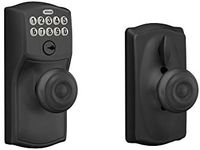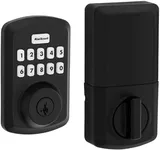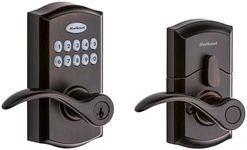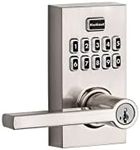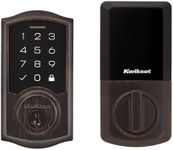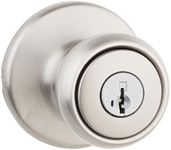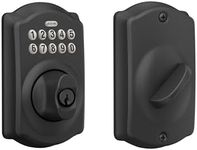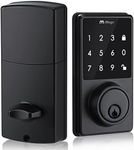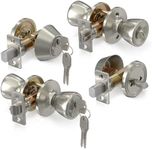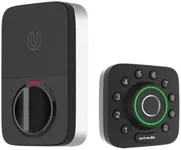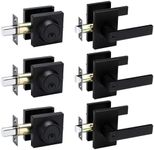Buying Guide for the Best Mechanical Door Locks
Choosing the right mechanical door lock is crucial for ensuring the security and convenience of your home or office. Mechanical door locks are reliable, durable, and do not require batteries or electricity to function. When selecting a mechanical door lock, it's important to consider various specifications to ensure you get the best fit for your needs. Here are some key specifications to consider and how to navigate them.Lock TypeThe lock type refers to the mechanism used to secure the door. Common types include deadbolts, knob locks, lever handle locks, and mortise locks. Deadbolts are known for their high security and are often used in conjunction with other locks. Knob locks and lever handle locks are more common for interior doors. Mortise locks are more complex and offer a higher level of security, often used in commercial settings. Choose a lock type based on the level of security you need and the door's location.
MaterialThe material of the lock affects its durability and resistance to tampering. Common materials include brass, stainless steel, and zinc alloy. Brass is durable and resistant to corrosion, making it a good choice for exterior doors. Stainless steel is strong and resistant to rust, suitable for both interior and exterior use. Zinc alloy is also durable and often more affordable. Consider the environment where the lock will be used and choose a material that offers the best combination of strength and resistance to the elements.
Security GradeSecurity grades are standardized ratings that indicate the level of security a lock provides. These grades are often determined by organizations like ANSI (American National Standards Institute). Grade 1 locks offer the highest level of security and are suitable for commercial use or high-security areas. Grade 2 locks provide a good balance of security and affordability, making them ideal for residential use. Grade 3 locks offer basic security and are typically used for interior doors. Choose a security grade based on the level of protection you need.
Keyway TypeThe keyway type refers to the design of the key and the lock's internal mechanism. Common keyway types include standard pin tumbler, high-security, and restricted keyways. Standard pin tumbler keyways are widely used and offer basic security. High-security keyways have additional features to prevent picking and bumping, providing enhanced security. Restricted keyways are controlled by the manufacturer, making it difficult to duplicate keys without authorization. Consider the level of key control and security you need when choosing a keyway type.
Ease of InstallationEase of installation refers to how simple it is to install the lock on your door. Some locks come with detailed instructions and all necessary hardware, making them easier to install for DIY enthusiasts. Others may require professional installation, especially if they involve more complex mechanisms like mortise locks. If you prefer to install the lock yourself, look for models that are designed for easy installation. If security is your top priority, consider hiring a professional to ensure the lock is installed correctly.
Additional FeaturesAdditional features can enhance the functionality and convenience of your mechanical door lock. These may include features like keyless entry options, adjustable backsets, and anti-drill plates. Keyless entry options, such as combination locks, provide added convenience and eliminate the need for keys. Adjustable backsets allow the lock to fit different door thicknesses. Anti-drill plates provide extra protection against drilling attacks. Consider which additional features would be beneficial for your specific needs and choose a lock that offers those options.
